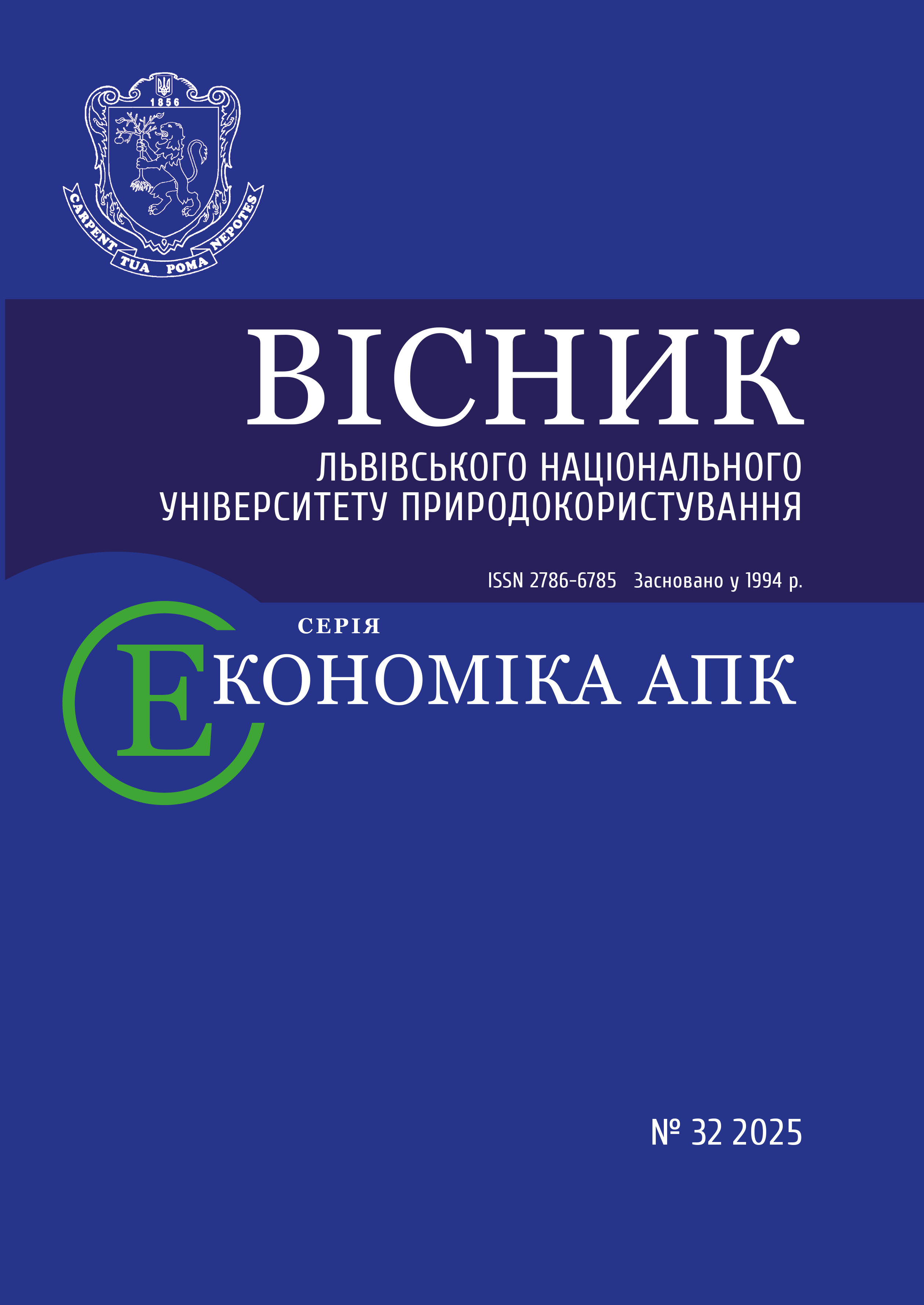ЦИФРОВА ТРАНСФОРМАЦІЯ ОБЛІКУ ТА АУДИТУ НА ОСНОВІ СУЧАСНИХ ІНФОРМАЦІЙНИХ СИСТЕМ
DOI:
https://doi.org/10.31734/economics2025.32.050Ключові слова:
бухгалтерський облік, аудит, цифрова трансформація, інформаційні системи, хмарні технології, фінансова звітність, цифрова економікаАнотація
У статті розкрито сутність цифрової трансформації обліку та аудиту в умовах глобальної діджиталізації економіки та активного впровадження інновацій у сфері управління фінансовою інформацією. Обґрунтовано, що традиційні підходи до ведення обліку та здійснення аудиту втрачають ефективність через зростання обсягів даних, необхідність оперативного прийняття рішень та підвищені вимоги до прозорості звітності. Досліджено вплив сучасних інформаційних систем, зокрема ERP-рішень, хмарних платформ, технологій штучного інтелекту та машинного навчання, на автоматизацію облікових процесів та якість фінансової інформації. Проаналізовано переваги хмарних технологій, зокрема доступність у реальному часі, зниження витрат на ІТ-інфраструктуру та інтеграційні можливості з іншими цифровими сервісами. Висвітлено міжнародний досвід упровадження електронної звітності (SBR) у країнах із розвиненою цифровою інфраструктурою. Охарактеризовано стан цифровізації облікової сфери в Україні, з урахуванням галузевих та організаційних відмінностей. Особливу увагу приділено трансформації аудиту, де активно застосовуються Big Data, алгоритми виявлення аномалій, блокчейн, а також цифрові платформи провідних аудиторських компаній. Визначено основні переваги цифровізації аудиторських процедур, зокрема зростання точності, прозорості, оперативності та аналітичності перевірок. Наголошено на викликах, серед яких: необхідність цифрових компетентностей, забезпечення кібербезпеки, адаптація нормативної бази та дотримання професійної етики. Обґрунтовано, що цифрова трансформація обліку та аудиту є не лише технічним оновленням, а стратегічним напрямом розвитку, який вимагає інтеграції технологічних інновацій, державної підтримки та оновлення освітніх підходів.
Посилання
Alles M. Drivers of the Use and Facilitators and Obstacles of the Evolution of Big Data by the Audit Profession. Accounting Horizons. 2015. Vol. 29. No 2. P. 439–449.
Appelbaum D., Kogan A., Vasarhelyi M. Big Data and Analytics in the Modern Audit Engagement: Research Needs. Journal of Information Systems. 2017. Vol. 31. No 3. P. 1–20.
Balaziuk O., Pyliavets V. Blockchain technology: Essence and areas of application. Economy and Society. 2022. No 43. https://doi.org/10.32782/2524-0072/2022-43-13.
Bardash S. V., Hrabchuk I. L. Digital technologies in accounting: Key opportunities and risks. Effective Economy. 2021. No 9. https://doi.org/10.32702/2307-2105-2021.9.18.
Chenash V. S., Abramov A. P., Shebeshten E. H. Development of accounting systems in Ukraine under the influence of digital technologies. Current Issues of Economic Sciences. 2024. No 3–4. https://doi.org/10.5281/zenodo.14011609
Digital transformation of business processes in Ukraine: Best practices of domestic business and modern challenges / L. Melnyk et al. Mechanism of Economic Regulation. 2024. Vol. 2. No 104. P. 54–60. https://doi.org/10.32782/mer.2024.104.07
Hevlych L. L. The accounting profession in the digital economy. Economics and Management Organisation. 2021. Vol. 3. No 43. P. 138–146. https://doi.org/10.31558/2307-2318.2021.3.13
ICAEW. Digitalisation of Accounting and Finance Functions. Institute of Chartered Accountants in England and Wales, 2020. URL: https://www.icaew.com (Accessed January 14, 2025).
IFAC. The Future of Accounting. International Federation of Accountants, 2021. URL: https://www.ifac.org (Accessed January 14, 2025).
Ionin Ye. Accounting and analytical support of business processes in the digital economy. Economic Analysis. 2023. Vol. 33. No 1. P. 172–191. https://doi.org/10.35774/econa2023.01.172/
Kononenko L. V., Nazarova H. B., Savchenko V. M. Organisation of accounting and auditing in the context of the use of modern digital technologies: Current state, problems and prospects. Problems of Modern Transformations. Series: Economics and Management. 2025. No 18. https://doi.org/10.54929/2786-5738-2025-18-09-03/
KPMG Clara. URL: https://kpmg.com/ua/uk/home/services/audit/kpmg-clara.html (Accessed January 15, 2025).
Kravchenko I. Y. Prospects for the implementation of digital economy tools in statistical analysis, accounting, and auditing systems. Accounting and Finance. 2022. Vol. 3 No 97. P. 12–20. https://doi.org/10.33146/2307-9878-2022-3(97)-12-20.
Kuz V. I. Development of accounting under the digitalisation of economic and management processes. Business Inform. 2021. No 6. P. 197–204. https://doi.org/10.32983/2222-4459-2021-6-197-204/
Lehenchuk S. F., Zavaliі T. O., Denysiuk O. M. Big Data in strategic management accounting. Problems of Theory and Methodology of Accounting, Control and Analysis. 2023. Vol. 3. No 56. P. 14–20. http://dx.doi.org/10.26642/pbo-2023-3(56)-14-20.
Nikolashyn A. O. Digital audit: Basic elements and innovative technologies. Investments: Practice and Experience. 2023. No 9. P. 75–80.
OECD (2016). Standard Business Reporting (SBR): Case Studies and Lessons Learned. Organisation for Economic Co-operation and Development. URL: https://www.oecd.org/gov/regulatory-policy/standard-business-reporting.pdf (Accessed January 15, 2025).
OECD releases fifth edition of Corporate Tax Statistics publication. URL: https://www.ey.com/en_gl/technical/tax-alerts/oecd-releases-fifth-edition-of-corporate-tax-statistics-publicat (Accessed January 17, 2025).
Putsenteilo P. R., Dovbush A. V. Main directions of accounting development in the digital economy. Innovative Economy. 2021. Vol. 3–4. No 87. P. 140–151. https://doi.org/10.37332/2309-1533.2021.3-4.
Semaniuk V, Melnyk N. The impact of digital technologies on the business information environment in the conditions of the Fifth Industrial Revolution. Bulletin of Economics. 2022. No 3. P. 203–212. https://doi.org/10.35774/visnyk2022.03.203.


